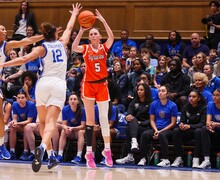SU’s inaugural Office of Diversity and Inclusion symposium ushers inclusivity forward
Lars Jendruschewitz | Asst. Photo Editor
Suzette Meléndez and Christina Papaleo were the co-chairs of the symposium. The symposium included a keynote panel with university leadership and research project presentations from students and faculty regarding inclusivity.
Get the latest Syracuse news delivered right to your inbox.
Subscribe to our newsletter here.
Syracuse University’s Office of Diversity and Inclusion held its inaugural Diversity, Equity, Inclusion and Accessibility Symposium on Tuesday in efforts to foster an accepting campus environment.
The symposium, held in the Schine Student Center, included presentations, roundtable discussions and displays of student, staff and faculty efforts to promote inclusivity on SU’s campus. There was also a keynote discussion panel where university leaders discussed the future of admissions after the overturning of affirmative action.
An estimated 700 people registered to attend the symposium, according to a campus-wide email. SU’s Office of Diversity and Inclusion hosted a forum – with just 160 participants – in February asking for community input that inspired the symposium.
The symposium was co-sponsored by the Center on Disability and Inclusion, the College of Professional Studies, Hendricks Chapel, the Office of Faculty Affairs and the Whitman School of Management.
Each presentation at the symposium was developed by SU students, staff and faculty. There were presentations on topics like race, gender, ethnicity, sexual orientation and disabilities in the classroom and workplace. Each one addressed how its topic was culturally relevant in the past and today.
Dr. Charisse L’Pree Corsbie-Massay, a professor in the S.I Newhouse School of Public Communications, presented throughout the symposium. One of her presentations, “Designing a Home College Experience at Newhouse,” focused on the ways Newhouse is trying to give students the skills to critically analyze media content pertaining to DEIA.
L’Pree teaches COM 346: Race, Gender, and the Media, which became a requirement for Newhouse students 10 years ago.
“The university is absolutely doing its damnedest to change things at an institutional level,” L’Pree said. “(DEIA) cannot impact every person’s day-to-day interactions with other people, but I think the university has implemented a lot of policies, a lot of classes and they’re gearing more students towards study abroad.”
All of SU’s schools and colleges were represented in Tuesday’s symposium by student representatives, student organizations and faculty who highlighted their projects and research on inclusivity.
School of Architecture students Timothy Xing, Weini Xiong and Shreya Potluri showcased their work on “Designing for Diversity, Equity, Inclusion, and Access: Proposals for a Youth Hostel.”
Each student crafted a different design. Potluri’s creation, based in the Westcott neighborhood, was geared toward encouraging community among young visitors. Her hostel’s design also featured a library in its lobby.
“The library is supposed to foster ideas of accessibility and inclusiveness and bring other people in the community to interact,” Potluri said.
Amelie Chanfreau and Zara Clott, both fashion design majors, presented “Reimagining Fashion: Empowering Diversity through Inclusive Design and Sizing,” a design project that created clothing for people with disabilities.
“We had to design an outfit that would accommodate a certain disability,” Clott said. “Our group’s focus was autism, and so we made our pieces to be tagless, soft and focused on calming colors. Another group focused on people (who use) wheelchairs, and they made a belt that could be comfortable to sit on.”
Following the oral presentations, the event moved to a keynote discussion panel featuring Chancellor Kent Syverud, Vice Chancellor, Provost and Chief Academic Officer Gretchen Ritter and Senior Vice President and Chief Student Experience Officer Allen Groves. The three discussed SU’s steps forward following the Supreme Court’s decision banning affirmative action.
Ritter and Groves are part of a working group SU formed in anticipation of the decision. In Wednesday’s University Senate meeting, the first since affirmative action was overturned, Ritter announced SU will add an application question asking prospective students how they’ll contribute to a “welcoming” campus community.
Ritter said in the USen meeting that the university will also expand recruitment of first-generation and low-income prospective students to maintain diversity. SU will keep legacy admissions after administrators conducted a review of the policy this summer.
L’Pree said that over her 10 years at SU, she’s seen the university make improvements with outreach and symposiums like Tuesday’s, but there’s still room for improvement.
“How has my individual experience as a first-gen faculty, woman of color, first-gen American, you know, how has all that changed?… I would say that from a personal perspective, like understanding what I have to deal with, little has changed. I feel like I’m still dealing with a lot of non-inclusive bullsh*t,” L’Pree said. “You can’t legislate attitudes.”
The symposium closed with a performance by the Desi Performance Club, a student group that performs traditional Indian dances, and remarks by Suzette Meléndez and Christina Papaleo, the co-chairs of the symposium.
“Part of what made me so happy today was to see students, staff, and faculty engaging together and coming up to me saying that they needed this,” said Meléndez, who is a faculty fellow for the Office of Strategic Initiatives in Academic Affairs and the Office of Diversity and Inclusion and a professor of law. “People are saying they felt seen and heard, and it’s sparking the conversation about how to keep doing this better.”
As the symposium continues biennially, Meléndez said she hopes to engage even more students, faculty, staff and people outside of the SU community.
“It was really an honor and a privilege for me to be a part of such a wonderful planning committee, and I find that sometimes the best work we can do, especially revolving diversity, equity, inclusion and accessibility is in collaboration,” Meléndez said.
Published on October 4, 2023 at 1:12 am





